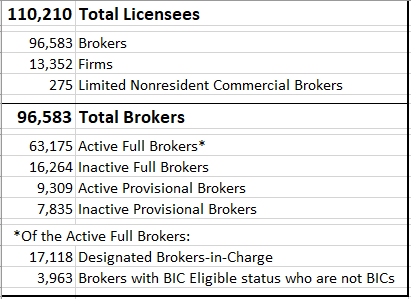Bulletin Search
Commission Spotlight: Janet B. Thoren
Janet Thoren, Legal Counsel, has been employed by the North Carolina Real Estate Commission since 1997 and has been the Director of Regulatory Affairs since 2012. She is a native of Fayetteville, NC, and received her undergraduate degree from Pembroke State University, and her Juris Doctorate degree from the University of North Carolina School of Law.
After receiving her Juris Doctorate degree, Janet joined a Hillsborough law firm where she specialized in residential and commercial transactions.
As Legal Counsel and Director of Regulatory Affairs, she oversees the Commissions legal, investigative, rulemaking and legislative functions, prosecutes complaints before the Commission, conducts settlement negotiations of contested cases, and responds to inquiries relating to License Law and Commission rules.
In 2005, Janet was appointed as Special Assistant United States Attorney in the Western District of North Carolina, where she has assisted the FBI and US Attorney’s Office with mortgage fraud cases. Janet has a daughter who serves in the United States Air Force and a son in high school who plays travel hockey.
Disciplinary Actions
CHERIE L SCHULZ (Richlands) – By Consent, the Commission reprimanded Cherie L Schulz effective January 2, 2020. The Commission found that Respondent failed to respond to letters of inquiry issued by Commission staff within fourteen days of receipt. Respondent was warned in a previous case to timely respond to such letters.
CHERIE SCHULZ REALTY FIRM INC. (Richlands) – By Consent, the Commission reprimanded Cherie Schulz Realty Firm Inc. effective January 2, 2020. The Commission found that the firm’s broker-in-charge failed to respond to letters of inquiry issued by Commission staff within fourteen days of receipt. The broker-in-charge was warned in a previous case to timely respond to such letters.
Postlicensing Education Deadline
This article from the January eBulletin is republished here to remind brokers of the new Postlicensing Education requirement effective July 1, 2020.
Beginning July 1, 2020, Rule 58A .1902 will require a Provisional Broker to complete all three 30-hour Postlicensing courses within 18 months of initial licensure in order to maintain active license status.
If you were licensed anytime during 2018, you must complete all your Postlicensing courses by July 1, 2020. If you have been licensed in 2019, you will have at least 18 months from your date of licensure to complete the courses.
Example #1: Licensed on February 1, 2018
- 1st Postlicensing course deadline: February 1, 2019
- 2nd Postlicensing course deadline: February 1, 2020
- 3rd Postlicensing course deadline: June 30, 2020
Example #2: Licensed on March 17, 2019
- 1st Postlicensing course deadline: March 17, 2020
- 2nd & 3rd Postlicensing course deadlines: September 17, 2020
Additional information about this important change is provided in the General Update (GENUP) and Broker-in-Charge (BICUP) courses throughout the year. Also, if you are a provisional broker, be on the lookout for email communications from the Commission about the changing education deadlines.
If you have further questions regarding this rule change, please contact the Education and Licensing Division at 919.875.3700.
Postlicensing Education Deadline
This article from the December eBulletin is republished here to remind brokers of the new Postlicensing Education requirement effective July 1, 2020.
Beginning July 1, 2020, Rule 58A .1902 will require a Provisional Broker to complete all three 30-hour Postlicensing courses within 18 months of initial licensure in order to maintain active license status.
If you were licensed anytime during 2018, you must complete all your Postlicensing courses by July 1, 2020. If you have been licensed in 2019, you will have at least 18 months from your date of licensure to complete the courses.
Example #1: Licensed on February 1, 2018
- 1st Postlicensing course deadline: February 1, 2019
- 2nd Postlicensing course deadline: February 1, 2020
- 3rd Postlicensing course deadline: June 30, 2020
Example #2: Licensed on March 17, 2019
- 1st Postlicensing course deadline: March 17, 2020
- 2nd & 3rd Postlicensing course deadlines: September 17, 2020
Additional information about this important change is provided in the General Update (GENUP) and Broker-in-Charge (BICUP) courses throughout the year. Also, if you are a provisional broker, be on the lookout for email communications from the Commission about the changing education deadlines.
If you have further questions regarding this rule change, please contact the Education and Licensing Division at 919.875.3700.
Be careful whom you TRUST with your trust and escrow accounts
Buyers, sellers, tenants, and property owners put a great deal of faith in brokers to safeguard their money. Whether it is an earnest money deposit, collection of rent, or a tenant security deposit, brokers have a fiduciary duty to their clients to ensure that the client’s property is not mismanaged or stolen. Under North Carolina General Statute § 93A-6(a)(7), any broker may be disciplined for “failing, within a reasonable time, to account for or to remit any monies coming into his or her possession which belong to others.” Commission rules go on to require brokers to deposit these entrusted funds into trust or escrow accounts within three banking days following receipt. A firm’s broker-in-charge (“BIC”) is tasked with maintaining its trust or escrow account(s) and its records in compliance with Commission rules. Nevertheless, what if a BIC is not good at math, or with money, or both? Could they have someone else be in charge of the account? Must that person be a licensed broker?
No Commission rule requires that the BIC be the only person who carries out the trust accounting function nor does a rule require that this person be a licensed broker. Some BICs have hired a Certified Public Accountant (“CPA”) or a bookkeeper for this task. Some BICs have very competent staff who assist with the management of the firm’s trust or escrow accounts. Regardless of whom the BIC uses, however, the BIC is ultimately responsible if those accounts are not compliant with Commission rules. Lately, there have been a number of incidents involving theft and conversion of entrusted funds for personal use. The people stealing the money have been identified as the accountants/bookkeepers themselves or other current or former employees. These actions are typically discovered during a routine audit or during an investigation by Commission staff where a shortage in the account is discovered. In the end, the majority of BICs have had to replenish the accounts with their own personal funds and face discipline by the Commission. So, how is a BIC to know whom in their office is the most trustworthy? Well, the short answer is, you cannot. But you can protect yourself and your firm by actually overseeing your trust account personnel and your financial records.
You see, embezzlement and theft are typically a crime of opportunity. The more difficult criminals to spot are usually involved in embezzlement cases. These are often smart associates or employees who do a good job of covering their tracks by creating bogus statements or journal entries and making multiple money transfers between accounts. Often, the criminal is the one you would least suspect.
For example, everyone in the office loves “Susie.” Susie has been with XYZ Company for 30 years since its beginning and helped the company grow. Susie makes the best pumpkin pie at holiday parties and even babysits coworkers’ kids on some weekends. Susie does not have a criminal record and has always been a rule follower. Susie has total control over the trust and escrow accounts and no clients have complained. However, what no one realizes is that Susie’s husband had a bad accident last year and has been out of work. Susie’s one income is not enough to cover the cost of their medical bills, mortgage, and car payments. Susie decides that she will “borrow” some money from the trust account with the full intention of paying it back. After she takes some money one month, another medical bill arrives, so she takes some more. She continues to withdraw money each month and now begins to move money between the trust accounts so that there is enough to cover upcoming payments. Finally, a year later, a client complains about not getting their rent proceeds on time and Susie’s scheme is finally discovered. The problem now is that Susie has taken over $50,000 within the past year, creating a major liability on the company.
Although Susie is a made-up person in this article, her story is very real. Susie is out there right now managing an account with little to no oversight. A BIC is simply signing the papers Susie places in front of them and has not looked at any independent documents in years. Rather than trying to predict whom they can trust with this responsibility, BICs should instead approach this problem with the mentality that they cannot trust anyone. Therefore, a BIC should have processes and procedures in place that do not leave one person in the office with sole authority. The BIC must review independent and supporting documentation to verify the trust accounts are properly balanced and reconciled. There should be accountability, checks, and balances in place to ensure that entrusted funds are kept safe.
Disciplinary Actions
HIGHER TECH REALTY NC LLC (Raleigh) – By Consent, the Commission reprimanded Higher Tech Realty NC LLC effective December 15, 2019. The Commission found that in 2019, a seller contacted Higher Tech Realty NC LLC about its “Guaranteed Offer Program.” A broker affiliated with Higher Tech Realty NC LLC discussed the “Guaranteed Offer Program, but did not deliver or review the “Working with Real Estate Agents” brochure, or enter into a written listing agreement. Without the seller’s authorization, a representative from Higher Tech Realty NC LLC solicited an offer from an iBuyer on the seller’s home, and the iBuyer made an offer through Higher Tech Realty NC LLC. The seller requested that Higher Tech Realty NC LLC get the iBuyer to retract and delete its offer. Higher Tech Realty NC LLC’s BIC contacted the iBuyer and arranged for it to delete the offer it made on the Seller’s property. Higher Tech Realty NC LLC’s listing agreement did not include required anti-discrimination language, but Higher Tech Realty NC LLC switched to using a form contract which does include the required language.
DONNA W WESTLING (Fayetteville) – By Consent, the Commission suspended the broker license of Ms. Westling for a period of 18 months effective September 30, 2019. The first 3 months shall be active with the remaining 15 months stayed for a probationary period through March 30, 2021. In addition, Ms. Westling is permanently prohibited from becoming a broker-in-charge. The Commission found that Ms. Westling managed a residential property where she disbursed rent proceeds to the property owner without receiving a rent payment from the tenants, causing deficit spending. Ms. Westling was unable to produce all financial trust account documents requested by the Commission’s investigator. A review of trust account records found that: deposit slips, checks, and bank statements were not labeled “trust” or “escrow”; cancelled checks failed to identify the purpose for disbursement; deposit tickets failed to identify the purpose of the monies deposited, the date of the deposit, or the remitter; ledger sheets failed to identify to whom disbursements were paid; there was a lack of an audit trail; and that deficit spending was occurring. Ms. Westling failed to provide all leases and management agreements to the Commission’s investigator. Ms. Westling disbursed funds from the Tenant Security Deposit (“TSD”) account prior to the tenant vacating the subject property and in an amount more than the TSD collected, leading to a shortage.
BILAN MO (Charlotte) – By Consent, the Commission reprimanded Bilan Mo effective December 15, 2019. The Commission found that in or around March 2018, Ms. Mo was a provisional broker working for a firm that did not offer property management services. Ms. Mo entered into an oral property management agreement with the owner of a property, without prior experience or requesting assistance from an experienced broker and collected a $1,640 security deposit and monthly rent from the tenant, which she placed in her personal account. Ms. Mo also deducted a monthly management fee from the rents she collected during the one year period she managed the property. Ms. Mo’s BIC was unaware of any of the property management activities performed by Ms. Mo. There was no evidence that Ms. Mo failed to deliver proceeds to the landlord-client.
MITCHELL J DAILEY (Wilson) – By Consent, the Commission suspended the broker license of Mitchell J. Daily for a period of 1 month effective December 15, 2019. The Commission found that in 2002, while licensed as a salesperson, Mr. Daily was convicted of reckless driving but failed to report the conviction to the Commission. On or about June 2003, Mr. Daily applied for a broker license and disclosed his reckless driving conviction. In 2012, Mr. Daily was convicted of a DWI – Level 5 and failed to report the conviction to the Commission. On or about May 4, 2018, Mr. Daily was convicted of DWI – Level 2 and again failed to report this conviction to the Commission. On or about June 30, 2018, Mr. Daily let his broker license expire. On or about December 17, 2018, while applying for reinstatement of his license, Mr. Daily disclosed that he had received a criminal conviction since his last renewal which he had not reported to the Commission.
THOMAS J SANDERSON (New Bern) – By Consent, the Commission suspended the broker license of Mr. Sanderson for a period of 12 months effective December 6, 2019. The Commission then stayed the suspension for a probationary period through December 6, 2020. The Commission found that an audit of Mr. Sandersons’ trust accounts showed evidence that Mr. Sanderson deposited credit card charges into Mr. Sandersons’ operating account instead of the trust account, failed to perform reconciliations, and failed to accurately input expenses and deposits. Mr. Sandersons’ trust account lacked a clear audit trail. There was a shortage of $1,475 in Mr. Sandersons’ tenant security deposit account and a shortage of $18,244.50 in the rental account. Mr. Sanderson deposited money to fully fund both accounts.
TJS PROPERTIES INC (New Bern) – By Consent, the Commission suspended the broker license of TJS Properties Inc. for a period of 12 months effective December 6, 2019. The Commission then stayed the suspension for a probationary period through December 6, 2020. The Commission found that an audit of TJS Properties Inc.s’ trust accounts showed evidence that TJS Properties Inc. deposited credit card charges into TJS Properties Inc.s’ operating account instead of the trust account, failed to perform reconciliations, and failed to accurately input expenses and deposits. TJS Properties Inc.s’ trust account lacked a clear audit trail. There was a shortage of $1,475 in TJS Properties Inc.s’ tenant security deposit account and a shortage of $18,244.50 in the rental account. TJS Properties Inc. deposited money to fully fund both accounts.
BONNIE LYNN LASLO (Charlotte) – By Consent, the Commission suspended the broker license of Ms Laslo for a period of 18 months effective December 31, 2019. The Commission then stayed the suspension for a probationary period through June 30, 2021. The Commission found that Ms. Laslo placed a tenant in a property without a fully executed management agreement. Ms. Laslo failed to provide written disclosure to the buyer when an agent in her firm was acting as a dual agent for the sales transaction in which Ms. Laslo had an ownership interest. Ms. Laslo signed a management agreement, which listed two separate firms interchangeably, despite them being separately licensed entities. Some leases and management agreements contained provisions which Ms. Laslo never intended to perform, causing confusion. Ms. Laslo has now implemented corrective measures for these issues.
MANAGEMENT OFFICE PM LLC (Charlotte) – By Consent, the Commission suspended the broker license of Management Office PM LLC for a period of 18 months effective December 31, 2019. The Commission then stayed the suspension for a probationary period through June 30, 2021. The Commission found that Management Office PM LLC, placed a tenant in a property without an executed management agreement. One of Management Office PM LLC’s management agreements also included a separately licensed firm named as agent. Some leases and management agreements contained provisions which Management Office PM LLC never intended to perform, causing confusion. Management Office PM LLC has now implemented corrective measures for these issues.
REAL ESTATE REALTY LLC (Charlotte) – By Consent, the Commission suspended the broker license of Real Estate Realty LLC for a period of 18 months effective December 31, 2019. The Commission then stayed the suspension for a probationary period through June 30, 2021. The Commission found that Real Estate Realty LLC, placed a tenant in a property without an executed management agreement. One of Real Estate Realty LLC’s management agreements also included a separately licensed firm named as agent. Some leases and management agreements contained provisions, which the Real Estate Realty LLC never intended to perform, causing confusion. Real Estate Realty LLC has now implemented corrective measures for these issues.
CURTIS FRANKLIN WATERS (Charlotte) – By Consent, the Commission suspended the broker license of Mr. Waters for a period of 18 months effective December 31, 2019. The Commission then stayed the suspension for a probationary period through June 30, 2021. The Commission found that Mr. Waters helped to place a tenant in a property without an executed management agreement. Mr. Waters failed to provide written disclosure to the buyer when he was acting as a dual agent for a sales transaction in which another broker in his firm had an ownership interest in the property. Some leases and management agreements contained provisions, which Mr. Waters never intended to perform, causing confusion. Mr. Waters has now implemented corrective measures for these issues.
How to Login to your License Record
Did you know you can review and update your license record at any time on the Commission’s website?
To access your license record:
- go to www.ncrec.gov;
- click on Licensing;
- click on Licensee Login;
- enter your License Number and your Password (your Password is the last four digits of your social security number if you have not changed it); and
- click on Login.
Once you have logged into your record, you can:
- renew your license between May 15-June 30 each license year;
- reprint your renewal receipt if needed;
- view your Continuing Education (CE) record;
- view your Postlicensing education record;
- view and update your personal information such as address, telephone number, or email address;
- change your password; and
- view and download your digital pocketcard.
For more information about your license record, go to ncrec.gov, click Licensing, and select Licensee Login. If you are having difficulty with your login or have further questions, please contact the Education and Licensing Division at 919.875.3700.
Commission Spotlight: Miriam J. Baer
Miriam J. Baer has served as the Executive Director of the North Carolina Real Estate Commission since April 1, 2010. She is a native of Lawrence, Kansas, and graduated Summa Cum Laude from the University of Kansas.
After receiving her Juris Doctorate degree from the University of North Carolina School of Law in 1984, she entered private practice with a Raleigh law firm. Baer joined the Commission as its first Examination Coordinator and served for many years as its Legal Counsel and Assistant Director of the Legal Services Division.
Baer is the Immediate Past President of the Association of Real Estate License Law Officials (ARELLO) which is an international organization that promotes better administration and enforcement of real estate license and regulatory laws by its members.
Baer previously was an instructor in Meredith College’s Paralegal program and authored the textbook, “Legal Research in North Carolina.” In addition, she served as a member of the Real Property Section Council of the North Carolina Bar Association and past chair of the Bar Association/North Carolina Association of REALTORS Joint Forms Committee.
Baer’s duties as the Chief of Staff involve the oversight of the Commission’s Administrative, Education and Licensing, and Regulatory Affairs Divisions.
Staff Updates and Appearances

Natarsha Bastien has been employed as a Licensing Specialist in the Education and Licensing Division. Prior to joining the Commission, she was associated with a clinical research firm as a Veeva Vault Specialist and volunteered with the Triangle Area Chapter of the American Red Cross.

Andrew R. Cox has been employed as a License Specialist in the Education and Licensing Division. Prior to joining the Commission, he was employed as a public school teacher in North Carolina.

Shanna L Hardy has been employed as a Consumer Protection Officer in the Regulatory Affairs Division. Prior to joining the Commission, she was a residential real estate broker in North Carolina for 14 years. She holds B.S. degrees in Apparel Merchandising from East Carolina University and Accounting from Wake Technical Community College.

Tracy W. Sease has been employed as an Information Officer with the Regulatory Affairs Division. She holds a B.A in English from North Carolina State University with a concentration in professional writing and editing.
Charlene D. Moody, Legal Counsel and Assistant Director of the Regulatory Affairs Division, spoke to Real Estate By Design in Durham.
Jean A. Wolinski-Hobbs, Auditor/Investigator, spoke to the Longleaf Pine REALTORS® in Fayetteville.
Danielle M. Alston, Consumer Protection Auditor, and Nicholas T. Smith, Consumer Protection Officer, spoke to Urban Durham Realty.
Shanna L. Hardy, Consumer Protection Officer, spoke to Berkshire Hathaway Home Services York Simpson Underwood Realty in Raleigh.

